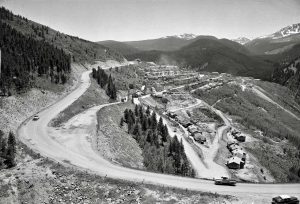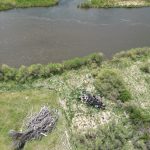Uganda’s Nyaka School founder hosting benefit Friday in Vail

Special to the Daily |
If You Go
What: One By One – Vail, a benefit for the Nyaka AIDS Orphan Project
When: 5 p.m. Friday
Where: Janis and Ronny Simon’s home, 2245 Alpine Drive, Vail
Tickets: $50
Information: For tickets, call 517-575-6623, or go to http://www.nyakaschool.org.
About AIDS in Uganda
Uganda has the highest percentage of AIDS orphans in the world. Of the 32 million people living in Uganda, there are an estimated 2.2 million AIDS orphans.
That’s 7.5 percent of Uganda’s population.
About Jackson Kaguri
Kaguri was born and raised in Uganda in East Africa. He came to the U.S. in 1995 as a visiting scholar studying human rights advocacy at Columbia University in New York.
He lost two family members to HIV/AIDS and watched countless others suffer, and became involved in efforts to fight HIV/AIDS and the devastation it leaves in its wake, such as the millions of orphans suffering from homelessness, poverty, hunger, and the lack of education.
Kaguri initiated Nyaka and Kutamba AIDS Orphans Schools in rural Uganda. The community schools provide education, housing, and support to orphans.
Jackson Kaguri is author of “The Price of Stones,” available at The Bookworm in Edwards
For more information go to http://www.nyakaschool.org and thepriceofstones.com.
VAIL — Jackson Kaguri is what a hero looks like.
Parker Lathrop is what a basketball player looks like, which can sometimes be the same thing.
Kaguri is the founder and director of Uganda’s Nyaka AIDS Orphans Project. Parker’s sister Emma and his mother, Sue Lathrop, launched the local Friends of Nyaka group to help him raise money and awareness.
There’s a benefit Friday in a private Vail home.
Life and basketball

Support Local Journalism
Parker Lathrop grew up in Vail and graduated Battle Mountain High School in 2010.
His mom Sue and sister Emma got him involved with Nyaka schools, so it seemed only fitting that he spend some of his young life there.
“One of my mom’s good friends died of AIDS, so this cause has always been close to her heart,” Parker said.
Sure, there are easier ways to fight AIDS than going to Uganda, but …
“You gain stronger connections with the students you work with directly. You grow so close to them. There are times I find myself wondering how they’re doing,” Parker said.
He helped tutor students to learn English and taught them how to play basketball. He played for Battle Mountain, so he knows how.
“That was my role. Teach kids to play a sport they’ve never played before,” Parker said.
The Nyaka School’s goal is to raise awareness and educate kids so they have good foundations for their futures.
“I had the idea that the students had lost their entire families to AIDS, but there’s a wide range of situations,” Parker said. “These kids don’t want to be defined by the disease.
Schools of hope
Kaguri launched Nyaka School in 2003 and Kutamba School in 2007. They provide free education for 724 of Uganda’s 2.2 million AIDS orphans. So far, every student has passed Uganda’s national exams, and several are attending college.
Nyaka school charges no tuition or fees. Children are guaranteed an education through high school from the moment they are enrolled.
Kaguri is tireless and relentless as he crosses the country raising awareness and support.
“We’ve helped hundreds, but there are millions more,” he said.
There’s a Grannies program.
“Grandmothers raise these kids because their moms and dads are dead,” Kaguri said.
They’ve built 131 houses for those grannies, each with a kitchen and an indoor toilet.
“It takes children to raise a village,” Kaguri said.
Kaguri was named a CNN Hero for his efforts, but, like most heroes, he’s trying to do everything he can all the time.
“The children and grandmothers we serve are the true heroes of Nyaka,” Kaguri said.
When he was a child in Uganda, Kaguri’s own grandmother walked 3.5 miles every night to read to him from the Bible. Only, she couldn’t read, as he later learned. Her father would read to her during the day, then she’d memorize the Psalms and then recite them to her young grandson.
No pencil, no school
Education is precious in places such as Uganda. It’s not required and it’s rare.
Students must buy their own uniforms, and they cannot wear anything else.
They have to pass tests to move on — scoring around 80 percent in both math and reading, Kaguri said.
Their parents must pay for them to go to school.
If any of these things don’t happen, their education is over.
And no one loses a pencil.
A pencil costs 2 cents in Uganda and students have to bring their own to school.
“If you show up without a pencil, they send you home to get one,” Kaguri said.
But most don’t go home because their families don’t have 2 cents.
“For the lack of 2 cents for a pencil, their education is over,” Kaguri told the students.
Kaguri is one of five children, so his father broke a pencil into five pieces.
Bound to go
Kaguri was not even 5 years old, watching his older brother and sisters leave for school each morning, wishing he could go, too. One day, he went, following them those 7.5 miles.
“Kids in my village walk to school, 7.5 miles,” Kaguri said. “There are no cars.”
He stood outside the window, peeking in when the teacher wasn’t looking when, from behind, he heard his father sharply call his name.
“He finally told me I could go to school, but if I failed one test, I’d have to quit,” Kaguri said. The Columbia University graduate never did.
Staff Writer Randy Wyrick can be reached at 970-748-2935 and rwyrick@vaildaily.com.










